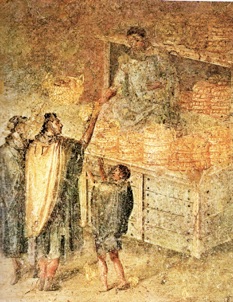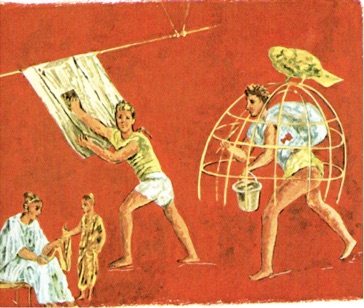Archaeological tours, packages and exclusive multy day excursions in Campania for tourists, lovers,
scholars and students.





Archaeological tours, packages and exclusive multy day excursions in Campania for tourists, lovers,
scholars and students.
When around the year 80BC Pompeii became a Roman colony grew both in terms of population and economy, and there was was a big boost in trade . The port guaranteed great wealth to the entire city, allowing the export of food products, textiles, cosmetics and more.
Economic activities of every kind were scattered throughout the city, especially along the “Via dell Abbondanza”, the main artery of the city so named for the relief of a cornucopia (horn symbol of abundance) on fountain near the Forum.
Often, thanks to the frescoes, the inscriptions, and the signs was possible to trace the names of the owners of the businesses located throughout the city, such us the termopolia (restaurants) of Vetutius Placidus and Asellina, and the fullonica of Sthephanus.
The professionals were usually grouped in corporations with a significant impact on the administration and policy of the city especially at the election time.
The most common occupations were those that took place within manufacturing plants and laboratories. There were bakers (pistores), the washers (fullones), numerous taverns (thermopolia), and textile and leather factories (officinae coriarorium). Some were itinerant traders or owners of shops, such as the greengrocers (pomarii). There were the owners of taverns (cauponae), the smiths (faber), barbers (tonsor), carpenters (lignarius), marble workers (marmorarius), goldsmiths (aurifex), the mosaicists (museiarii), peinters (pictores imaginarii or parietarii). Seems that the porters were powerful corporations (saccarii), the tenants (vindemiatores) and carters (cisiarii).
A well paid job, of which today we see the traces on the walls of ancient Pompeii, was the one of the scriptor, who painted on the walls in bright red letters posters announcing performances, sales, leases, or elections.
Considerable importance was covered by the agrimensores, highly skilled technicians able to measure and divide lands thanks to the use of theodolites very similar to those used by modern surveyors.
We should not forget the Lupae, who practiced in the Lupanares “the oldest profession in the world,” and their owners said Lenones.


Fresco with fullones
Fresco with baker
THE PROFESSIONS IN POMPEII
Pompeii Tour guide - Herculaneum Tour guide - Stabiae Tour guide - Oplontis Tour guide - Naples Tour guide
Amalfi Coast - Sorrento - Positano - Paestum Tour guide - Capua Amphitheater - Procida - Ischia - Capri
Copyright © Pompeiin.com - E-mail: info@pompeiin.com

